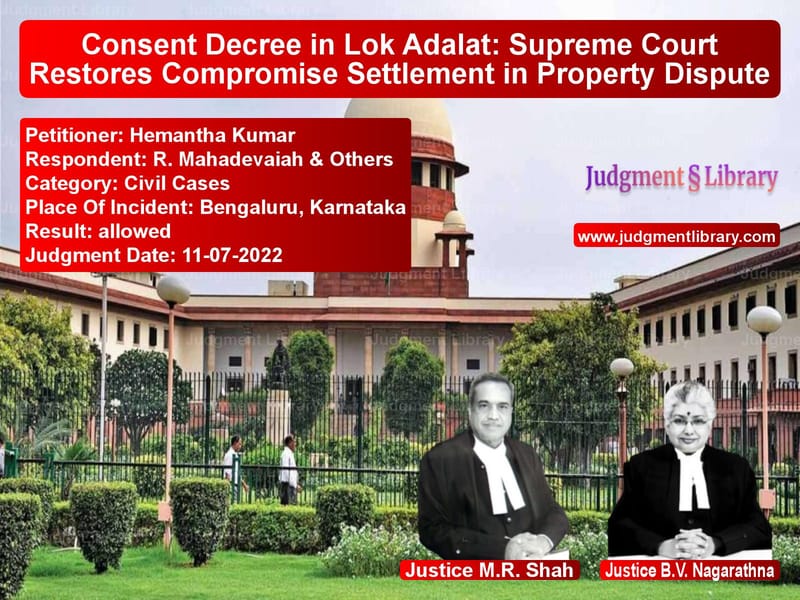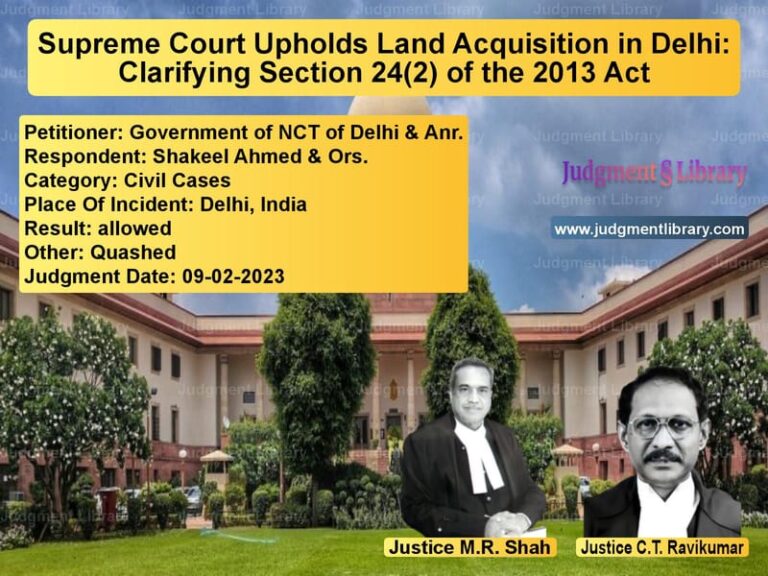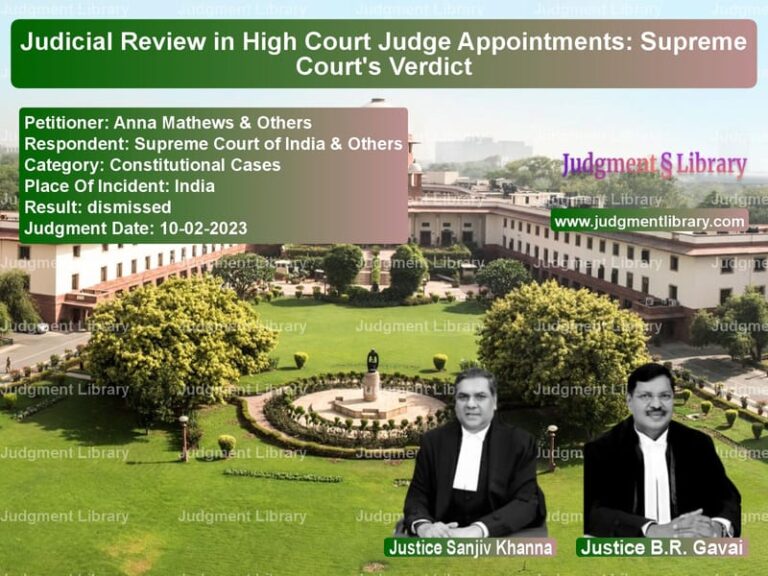Consent Decree in Lok Adalat: Supreme Court Restores Compromise Settlement in Property Dispute
The case of Hemantha Kumar vs. R. Mahadevaiah & Others revolved around a dispute concerning a consent decree passed by a Lok Adalat in a property transaction. The Supreme Court, in its judgment delivered by M.R. Shah and B.V. Nagarathna, set aside the Karnataka High Court’s decision, which had nullified the consent decree on allegations of fraud.
The key issue before the Court was whether a consent decree granted by a Lok Adalat could be challenged and set aside based on allegations that the process of obtaining it was misleading or fraudulent.
Background of the Case
The case stemmed from a property dispute where the appellant, Hemantha Kumar, had entered into a sale agreement with the defendants. The timeline of events was as follows:
- Original Suit: The appellant filed a suit for specific performance of the sale agreement in the Civil Court, Kunigal, in 2006.
- Compromise Application: On 18 August 2007, both parties filed an application under Order XXIII Rule 3 of the Civil Procedure Code (CPC), indicating a settlement and requesting a consent decree.
- Lok Adalat Decision: Instead of passing the decree in court, the Trial Court referred the case to the Lok Adalat, which recorded the settlement and granted the decree.
- Execution Petition: The appellant later filed an execution petition in 2013 to enforce the decree.
- Challenge by Defendants: The respondents challenged the consent decree in the Karnataka High Court, claiming it was obtained fraudulently.
- High Court’s Order: The High Court set aside the Lok Adalat decree and restored the original suit.
- Supreme Court Appeal: The appellant challenged the High Court’s order before the Supreme Court.
Petitioner’s Arguments
The appellant, Hemantha Kumar, argued that:
- The consent decree was voluntarily entered into by both parties.
- The defendants had received the full sale consideration, which was documented in the settlement application.
- Both parties’ lawyers were present in the Lok Adalat and endorsed the settlement.
- The High Court erred in questioning the authenticity of a settlement recorded in a Lok Adalat.
- The allegations of fraud were vague and unsubstantiated.
Respondents’ Arguments
The respondents, who were the original defendants, contended that:
- The consent decree was obtained by misleading the Trial Court and the Lok Adalat.
- The matter should not have been referred to the Lok Adalat.
- The consent terms were recorded in a manner that did not reflect the true intentions of the defendants.
- They should have been given an opportunity to prove fraud in court.
Supreme Court’s Analysis
The Supreme Court critically analyzed the High Court’s reasoning and found several flaws in its approach.
Validity of the Consent Decree
The Court noted that the parties had willingly entered into the settlement:
“The filing of an application under Order XXIII Rule 3 CPC is not disputed by the defendants. The consent decree was passed by the Lok Adalat in the presence of both parties and their legal representatives.”
Lok Adalat’s Authority to Grant Consent Decrees
The Supreme Court reaffirmed the principle that Lok Adalats have the authority to pass consent decrees:
“Merely because the matter was referred to the Lok Adalat cannot be a ground to doubt the genuineness of the consent decree. The proceedings before the Lok Adalat are legally valid and binding.”
Fraud Allegations Were Unsubstantiated
The Court observed that the allegations of fraud were vague:
“On what basis the High Court presumed that the counsel for the plaintiff misled the Court remains unclear. There was no independent evidence to support the allegations.”
High Court’s Error in Setting Aside the Decree
The Supreme Court criticized the High Court’s approach, stating:
“The High Court erred in assuming fraud without concrete evidence and in failing to appreciate the finality of Lok Adalat proceedings.”
Supreme Court’s Ruling
The Supreme Court ruled:
- The High Court’s judgment was set aside.
- The consent decree passed by the Lok Adalat was restored.
- The original suit was not to be reopened.
- The allegations of fraud were dismissed as unsubstantiated.
Conclusion
The Supreme Court’s decision reinforces the principle that consent decrees passed by Lok Adalats carry finality and cannot be lightly challenged. The ruling prevents frivolous litigation seeking to nullify settlements reached in Lok Adalats and ensures that parties honor their commitments in compromise agreements.
This judgment serves as an important precedent in cases involving property disputes, emphasizing that courts must exercise caution before interfering with settlements recorded in alternative dispute resolution mechanisms.
Petitioner Name: Hemantha Kumar.Respondent Name: R. Mahadevaiah & Others.Judgment By: Justice M.R. Shah, Justice B.V. Nagarathna.Place Of Incident: Bengaluru, Karnataka.Judgment Date: 11-07-2022.
Don’t miss out on the full details! Download the complete judgment in PDF format below and gain valuable insights instantly!
Download Judgment: hemantha-kumar-vs-r.-mahadevaiah-&-oth-supreme-court-of-india-judgment-dated-11-07-2022.pdf
Directly Download Judgment: Directly download this Judgment
See all petitions in Contract Disputes
See all petitions in Specific Performance
See all petitions in Property Disputes
See all petitions in Dispute Resolution Mechanisms
See all petitions in Judgment by Mukeshkumar Rasikbhai Shah
See all petitions in Judgment by B.V. Nagarathna
See all petitions in allowed
See all petitions in supreme court of India judgments July 2022
See all petitions in 2022 judgments
See all posts in Civil Cases Category
See all allowed petitions in Civil Cases Category
See all Dismissed petitions in Civil Cases Category
See all partially allowed petitions in Civil Cases Category







